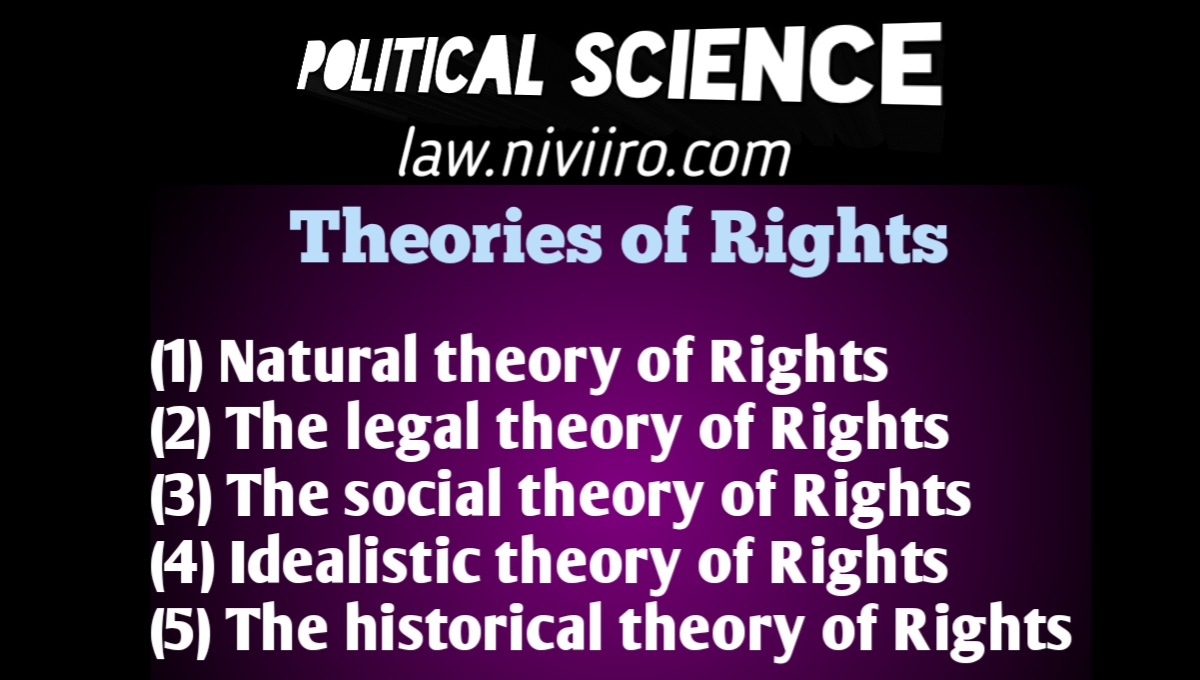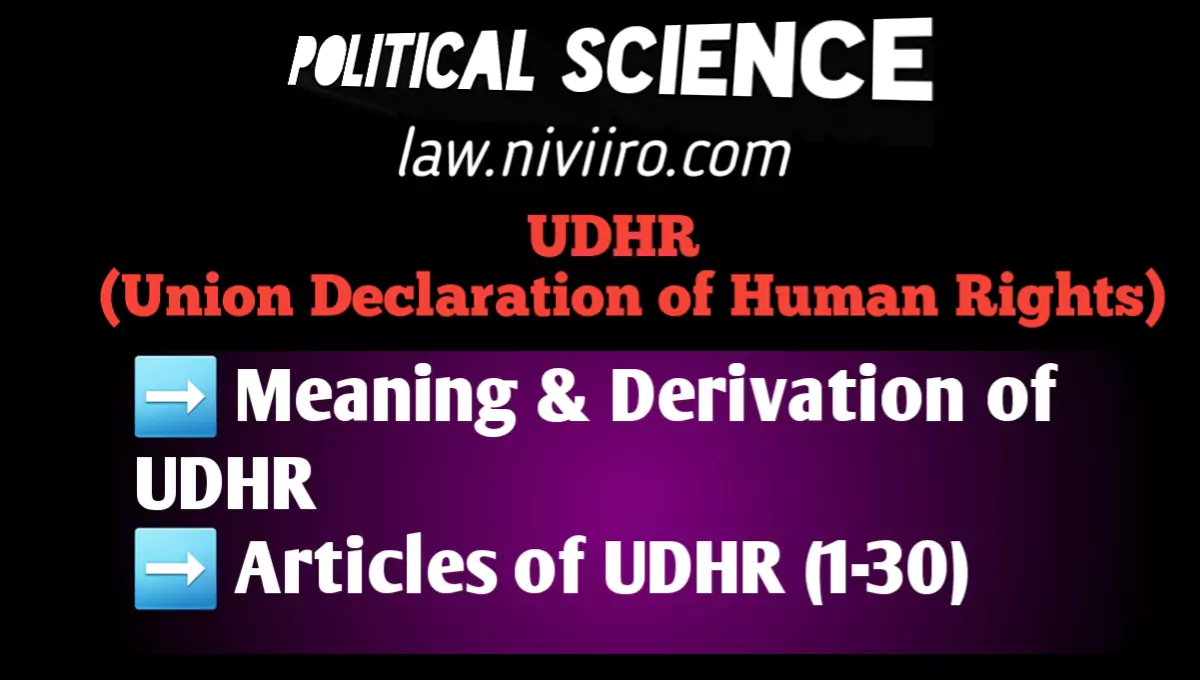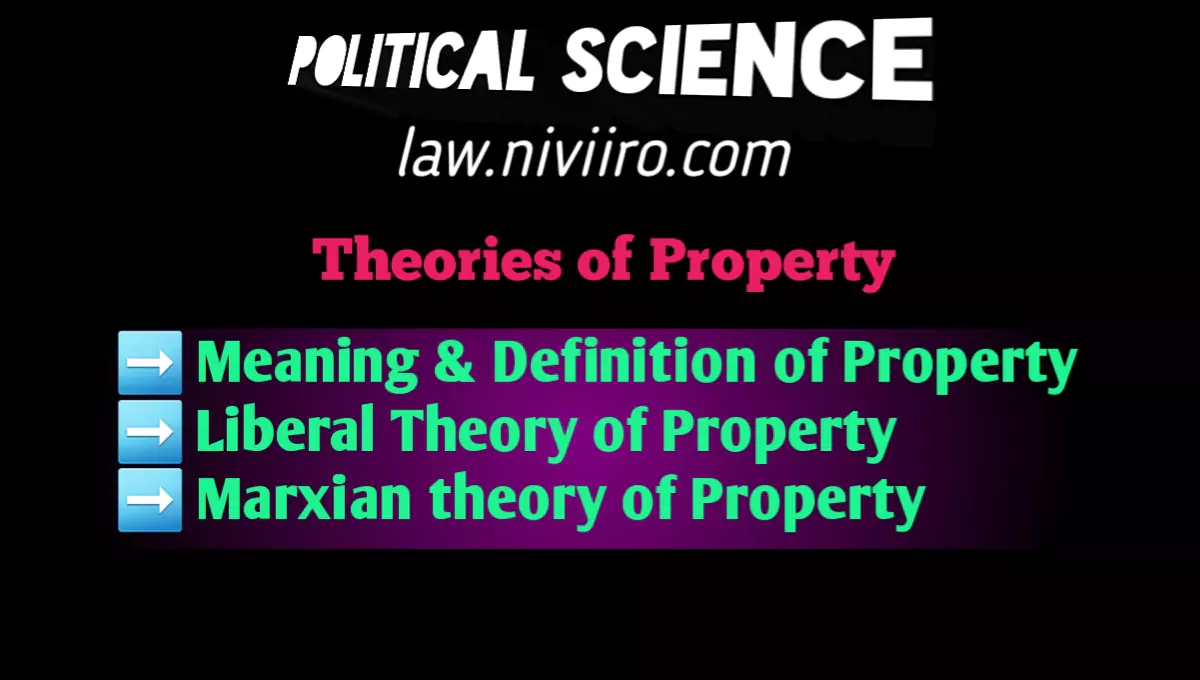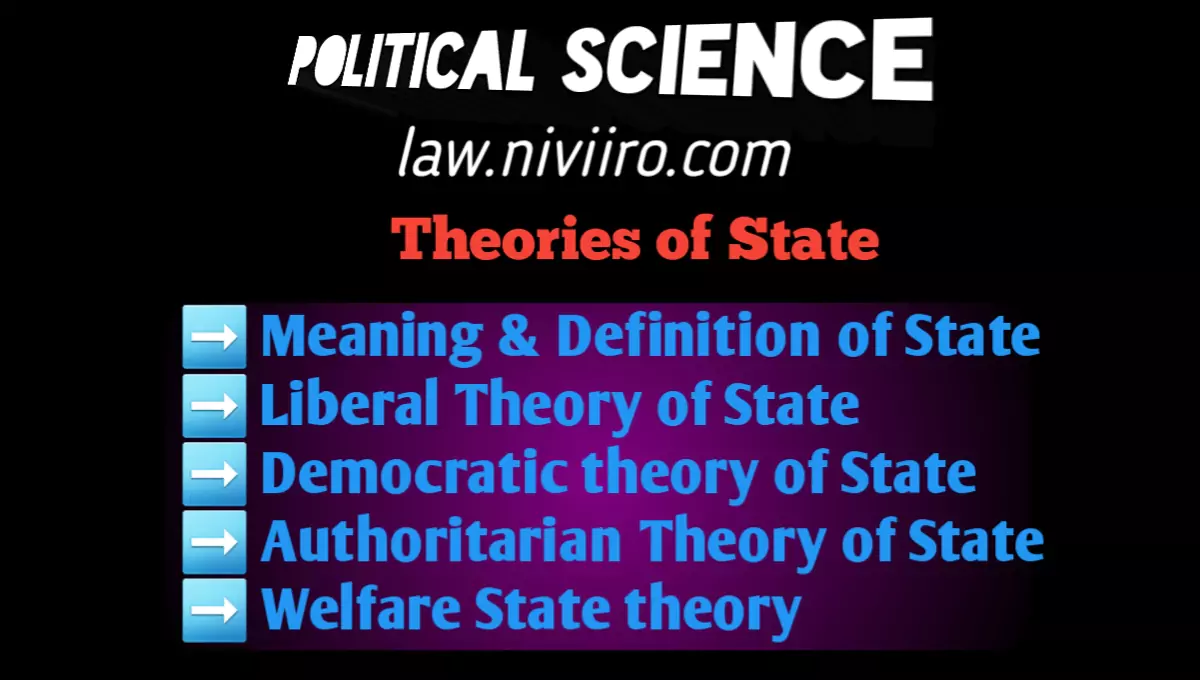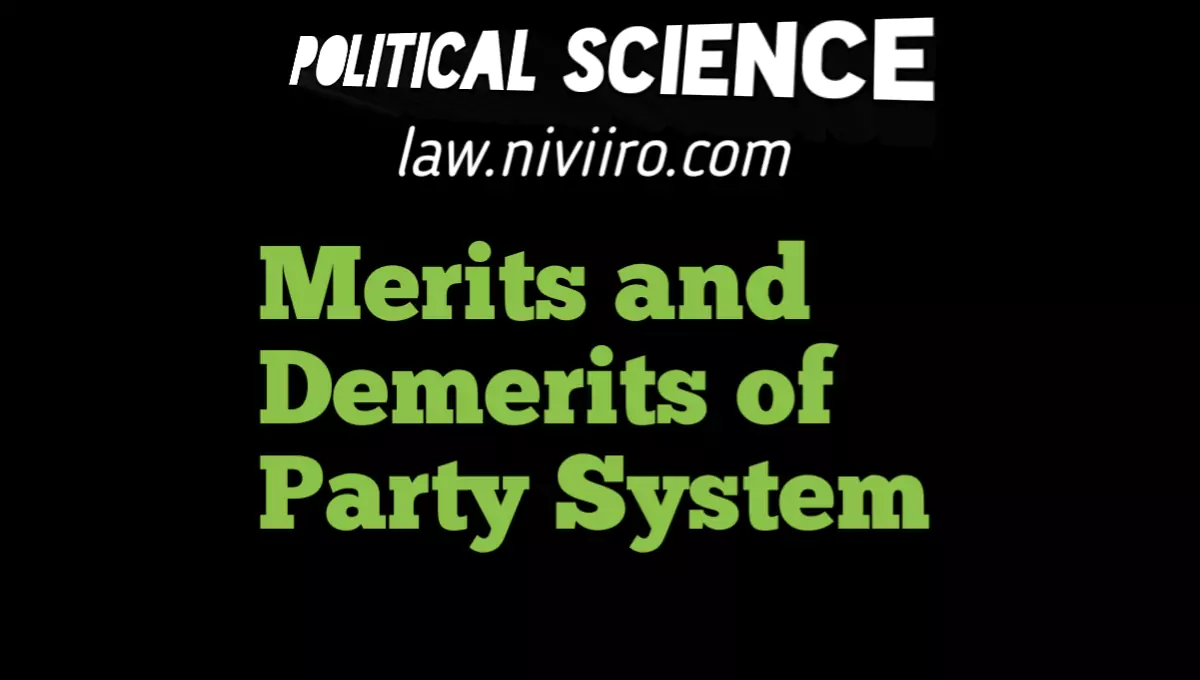Following are the major theories of rights:
- Natural Theory of Rights
- The Legal Theory of Rights
- The Social Welfare Theory of Rights
- Idealistic Theory of Rights
- The Historical Theory of Rights.
Natural Theory of Rights
This approach tries to persuade us that rights are natural. They originate in nature and are not the result of any manmade agency. Prof. E. Asirvathan believes that everyone has rights. He claims, “They are innate in him. They are as much a part of man’s nature as, say, his skin colour. They do not necessitate a lengthy explanation or justification. These are self-evident facts. They are merely dogmatically asserted “. The Theory of Natural Rights was popular in the seventeenth and eighteenth century, with John Locke and Thomas Pain emphasising it.
John Locke elaborated on this conception of rights in his Contract Theory. Cicero has beautifully summarised Natural Rights doctrine. “The existence of a universal and global law that is one with reason in both nature and human nature, and so knits together in a single social bond any being that possesses reason, whether God or man. The principle of natural law becomes a recognition of intrinsic worth in human personality, with the necessary implication of equality and universal brotherhood”.
Criticism of theory of Natural Rights
Critics have gone so far as to explicitly criticise this theory. They argue that man is a social animal by nature and has lived in society since the beginning of time (In the primitive times he lived in families which formed the small units of society). As a result, there was no state of nature prior to the emergence of human life. If we accept Hobbes, Locke, and Rousseau’s description of the state of nature for a second, we cannot ignore the reality that humans did not have any of these rights in the state of nature.
Whatever they enjoyed were not rights but powers because rights are always ensured by society and protected by the state. How could man have these rights prior to the establishment of the state and society? People have no rights in the condition of nature. They had enough power to accomplish whatever they wanted.
Legal Theory of Rights
Supporters of the Legal Theory of Rights argue that the state is the primary source of all rights. There are no inherent rights in man. They were also not endowed by nature. They are, on the contrary, produced and maintained by the state. The supporters’ membership in the state grants man the right to life. Rights are created by and preserved by the state. This theory’s proponents include Bentham, Holland, and Austin. Bentham believes that only those rights that are formulated or defined in the state constitution should be recognised, and that those rights that are not formulated or defined in the constitution should not be recognised.
The individual owes the state all rights and has no rights against the state. The state grants rights. The state defines rights and establishes the Bill of Rights. The state does not have precedence over rights. The state establishes a legal framework that secures rights. It is the state that supplies the list of rights and ensures their enjoyment. And it is the state that creates and enforces laws to protect human rights.
Criticism of Legal Theories of Rights
Legal Theory of Rights has been severely criticised on the following grounds ;
- Wilde maintains that the state does not grant all rights.
- If a state lacks a democratic system of government and fails to pay adequate attention to rights demands, this does not imply that the rights lose their value as rights. The fault is not with the rights claims, but with the state. Only in a democracy can rights demands be ignored.
- According to this theory, the state is absolute.
- According to Herbert Spencer, the state solely ensures the security of these rights. It does not give birth to rights.
- The true source of rights is our understanding of what is right and wrong. “Rights”, according to Plamenatz, “must have a foundation of right as against wrong”.
- This theory does not deal with rights philosophically.
- The state, according to H.J. Laski, does not create rights; it just recognises them. Limiting man’s rights only because of his state membership “is to destroy his personality rather than to pervert it.”
- Human rights are often based on religion, justice, and norms and traditions, and hence do not rely on the state’s mercy. If the state fails to recognise these rights, society does so.
Social Welfare Theories of Rights
Rights, according to advocates of social welfare theory, are the conditions for social welfare. They are produced by society with the goal of achieving societal welfare. Therefore, they “should all yield to what is socially useful or social desirable”. The main proponents of Social Welfare Theory are Jeremy Bentham and John Stuart Mill. Laski has gone so far as to suggest that “rights have no meaning without social unity.” The Social Welfare Theory is also supported by Chafte and Dean Pound. According to Chafte, only rights aimed at achieving social welfare should be enforced. As a requirement of social wellbeing, the state upholds rights. Conditions that are detrimental to social welfare should not be recognised.
Criticism of Social Welfare theories of Rights
Social Welfare Theory has been criticised on the following grounds:
- This concept is quite vague, and it is difficult to say exactly what contributes to social welfare.
- Wilde has gone so far as to criticise this notion, claiming that if rights are exclusively focused at achieving social welfare, individual liberty may be jeopardised and the individual may not have the opportunity to assert his rights.
- Social welfare is difficult to define.
- The Social Welfare Theory has many merits, yet we cannot agree on what is meant by social welfare. People exploit society and serve their personal interests under the name of social welfare. The similar thing happened in Italy under Mussolini’s reign.
- Individual liberty may be reduced to nothing in order to achieve social welfare.
Idealistic theory of Rights
The state is regarded as a divine institution by the Idealists. “State is a march of God on earth,” Hegel writes. The Idealists think that pleasant external conditions are essential for human life to be perfected. The state creates these conditions. Krause defines the rights system as “the organic whole of the outward conditions necessary to rational life.” A right, according to Henrici, is “that which is completely necessary to the maintenance of material conditions necessary to the life and perfection of human individuality.” In fact, human personality perfection is the ultimate goal toward which all rights should be focused. Individuals, as members of society, have rights, according to adherents of this idea.
Because man is born on state territory, he has no right to express his desires. In a bad state, a guy cannot refuse to give birth. Individual well-being is intertwined with societal well-being. The individual is subordinate to society, and the state recognises only moral, ethical, and socially beneficial rights. According to this theory, the state and human rights are inextricably linked. The proponents of this philosophy discuss rights in philosophical rather than legal terms. They believe that rights are based on morals rather than rules. They regard rights as essentials of the internal progress of man. Rights are the essentials of human perfection.
Criticism of Idealistic Theories of Rights
Idealistic Theory of Rights has been criticised on the following grounds:
- The state, according to this conception, is a divine institution. But, in reality, the state is not a divine institution.
- According to this theory, morality is the basis of law. Though this is true to a certain extent, the norm of morality varies from person to person and from society to society.
- Individual liberty can be reduced to nothing in order to promote social benefit.
Historical Theories of Rights
The historical theory of rights instils in us the idea that rights are the result of historical growth. Rights derive from norms and usages that formerly served a practical social purpose. These conventions and usages were passed down from generation to generation and were eventually recognised as inherent claims and rights.
Ritchie has very aptly observed in this regard, “those rights which people think they ought to have are just those rights which they have been accustomed to have or which they have tradition (whether true or false) of having once possessed. Custom is primitive law”, Edmund Burke maintains that the French Revolution was the outcome of the breach of customary human rights. The rulers of France breached customary rights of the people and people rose in revolt.
Criticism of Historical Theories of Rights
This theory has been criticised on the following grounds:
- This theory is flawed because not all rights are the result of historical evolution. The state creates and implements new laws to meet the demands of the period and replaces outdated, stale, and ineffective norms. for example, Child marriage, untouchability, the dowry system, class, caste, and creed distinctions, and many other rituals remained popular in India. However, in this day and age, the state has abolished all of them.
- Second, conventions evolve with the passage of time. As a result, relying on them is detrimental to the rights. Otherwise, laws would have to be amended on a daily basis.
- Third, all products of history and conventions cannot be considered or maintained as rights.
- Fourth, customs and traditions differ from one religion to the next, and all customs and traditions of all faiths cannot be considered rights.
- Long-standing norms might obstruct rights rather than becoming rights themselves.
Conclution theories of Rights
Though none of the theories discussed above is complete, yet each of the five theories is right to some extent. Every state guarantees the enjoyment of a few rights to the individual for the development of his personality. If an individual makes the misuse of the rights, the state can usurp his rights. Rights are not unlimited.
Related Post
Mention two main proponents of Social Welfare Theory ?
Jeremy Bentham and John Stuart Mill.
Who said,“State is a march of God on earth” ?
Hegel.
Mention major theories of rights ?
1. Theory of Natural Rights, 2. The Legal Theory of Rights, 3. The Social Welfare 4. Theory of Rights, 5. Idealistic Theory of Rights, 6. The Historical Theory of Rights.
References
- M.P. Jain, Political Theory liberal and Marxiam
- Prof. S.L. Verma, Modern Political Theory
- Prof. H.C. Verma, Modern Political Theory
- V.D. Mahajan, Political Theory
- J.C. Johari, Political Science
- R.C. Agarwal, Political Theory













